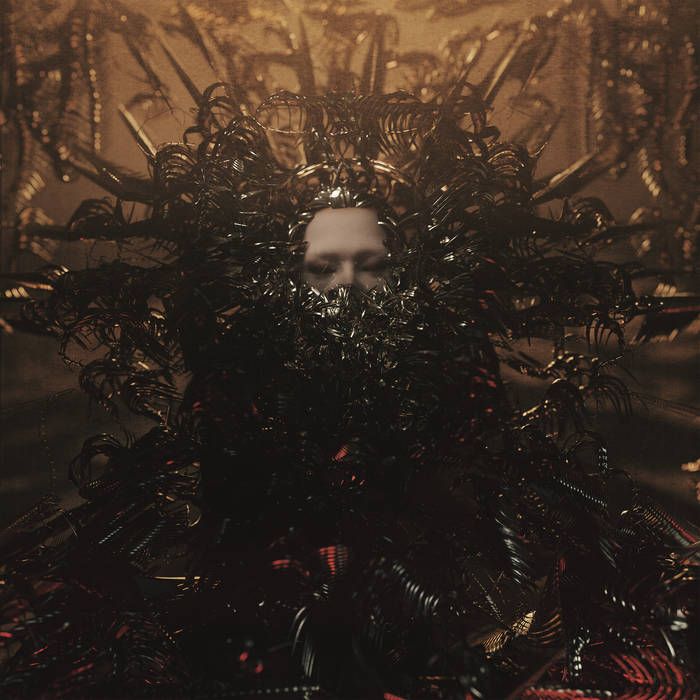
With no disrespect intended, because Korn do their thing, and do it well, but you simply don’t expect the band members’ side projects to stray too far from the mothership. Jonathan Davis, for example, produced a distinctive (and solid) album that focused on the gothic elements that crept into Untouchables, while Fieldy dabbled in those hip hop trappings that have always underpinned the band’s sound. So, when Munky, arguably one of the band’s quietest members, announced a collaboration with composer Chris Hunt, few would have expected the dark, experimental nature of the music. With the core duo joined by a number of guests, including Rizz of VOWWS, Deantoni Parks (The Mars Volta), Jacob Duzsik (Health), and Alain Johannes (QOTSA, Unkle), the album is an unexpected and frequently surprising head trip, taking in nine songs over the course of its thirty-three-minute run time. Daring and remarkably immersive, it stands alongside the likes of Massive Attack, Unkle, and Davidge with its cinematic, oft-brooding and occasionally beautiful soundscapes.
The album opens with the short, static-riven noise of Alignment, an eerie, post-industrial melange of haunting atmospherics and Aphex Twin-style beats. Guitar, while present, is clothed in delicate reverb, providing a counterpoint to the electronica and reminiscent of David Gilmour’s work with The Orb. Having eased the listener in, Venera escort us to a darker place with Erosion, which takes stuttering, drum ‘n’ bass elements, pairing them with survival horror synths to create a soundtrack that makes your skin crawl. Imagine Charlie Clouser’s work on Saw remixed by Alec Empire and you have some inkling of the oppressive soundscapes in which Venera deal and, like that movie, it’s impossible to edge away from the horrors that unfold. Next up, Venera are joined by Jacob Duzsik of the wonderful Health for Ochre, the opening to which feels like a warm bath after the visceral discomfort of Erosion. With Munky’s guitar once more lost in a haze of delicate reverb, the downtempo beat provides the perfect backdrop for a vocal piece that references the glacial trip hop of Davidge (Massive Attack / Halo). Perhaps unsurprisingly, given that it features Deantoni Parks of Mars Volta, Swarm Disintegration is far less coherent, the gleaming banks of synths now corroded and malfunctioning, spitting out wave after wave of static noise as splenetic drum ‘n’ bass shoots through the mix.
As the album continues, so Venera manage a tense ebb and flow, allowing moments of beauty to flourish in the darkness. As a case in point, Rizz (VOWWS) steps in to help out on the beautiful Hologram, a subtle and haunted piece that nods towards Massive Attack’s work with Elizabeth Fraser on Mezzanine. It’s an unbelievably gorgeous moment in the album and it’s followed by the short instrumental oasis of Surrender, which provides a haunting segue into the arid Triangle, which, in featuring Alain Johannes, sounds like a cross between Unkle and David Bowie’s final works – it’s something of a dark masterpiece and there’s a strong emotional undercurrent tugging away at the listener throughout. The album concludes with Helium, an instrumental coda that washes away the claustrophobic darkness of those early tracks, allowing the listener to emerge somehow cleansed by the journey.
Truly, I had no idea as to what I should expect from a collaboration between Munky and Chris Hunt, but this is something special indeed. The pair clearly found the collaboration invigorating, and everything from the performance to the mix is such that you truly lose yourself within the album for its thirty-minute runtime. With nods to albums such as Kicking A Dead Pig (Mogwai), Never Never Land (Unkle), and Mezzanine (Massive Attack), Venera’s self-titled debut has no inconsiderable lineage, yet it never sounds derivative, the duo taking their sound into a place that is as much Silent Hill ad Portishead. A diverse and truly mesmerising effort, Venera’s self-titled debut is a unique, occasionally unsettling listening experience. 9/10



